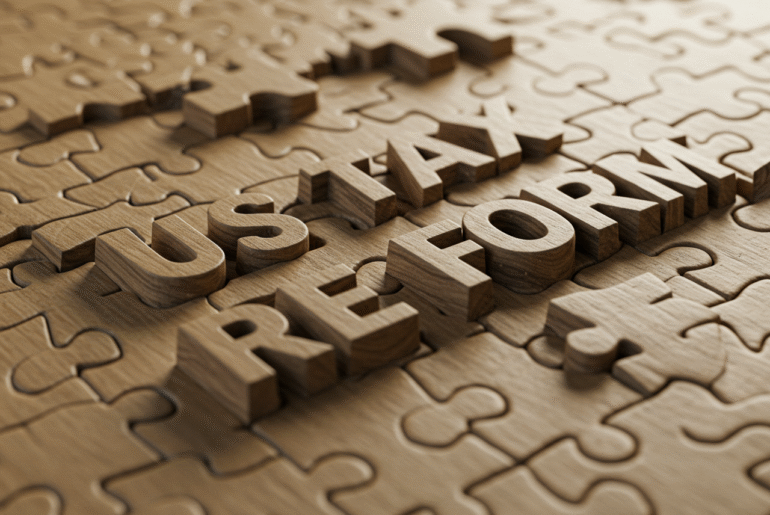This article may contain references to products or services from one or more of our advertisers or partners. We may receive compensation when you click on links to those products or services. Nonetheless, our opinions are our own.
The information presented in this article is accurate to the best of our knowledge at the time of publication. However, information is subject to change, and no guarantees are made about the continued accuracy or completeness of this content after its publication date.
Introduction
The One Big Beautiful Bill is a sweeping piece of tax reform legislation aimed at overhauling U.S. tax policy. It proposes changes to income tax rates, corporate taxes, deductions, and credits. The bill’s goal is to simplify the tax code, incentivize certain industries, and adjust rates to balance revenue and equity.
This comprehensive piece of legislation aims to address many facets of the current tax system, with a particular focus on equity and efficiency. It specifies how tax revenue will be utilized to support infrastructure, education, and healthcare initiatives, thereby creating a more sustainable economy.
Beneficiaries and Those Facing Higher Costs
Understanding the implications of the One Big Beautiful Bill is necessary for all taxpayers. As the legislation unfolds, staying informed will enable individuals to plan effectively for their finances. Active participation in discussions surrounding tax reform can make a significant difference in how these policies will ultimately affect you.
Likely Beneficiaries
- Small Business Owners: Potential lower taxes on small business profits could free up cash for reinvestment.
- Families with Children: Expanded tax credits for dependents could reduce overall tax burdens.
- Green Energy Supporters: Tax savings from incentives for investments in renewable energy could be substantial.
Possible Drawbacks
- Higher Earners: Increased rates for top income brackets could lead to higher tax bills.
- Investors: Changes to capital gains taxes may increase taxes on investment profits.
- Itemizers: Reduced or eliminated deductions could impact those who currently benefit from itemizing.
Proposed Changes to Tax Brackets
The bill may revise federal tax brackets, affecting the percentage of income you pay in taxes.
For instance, under the proposed system, taxpayers in different income brackets may see varied impacts. The bill includes numerous provisions that target specific income levels, allowing for a detailed analysis of how changes could influence individual tax obligations.
| Income Level | Current Rate | Proposed Rate (Hypothetical) |
|---|---|---|
| Under $50,000 | 12% | 10% |
| $50,000 to $100,000 | 22% | 20% |
| $100,000 to $200,000 | 24% | 22% |
| Over $200,000 | 32% | 35% |
Changes to Deductions
It’s important to note how these proposed changes could reshape general consumer behavior, particularly in housing and investment. By analyzing the impacts of deductions on home buying and investments, we can predict shifts in economic activity.
Deductions lower taxable income, but the bill could limit or remove certain popular options like mortgage interest or state tax deductions. If these disappear, taxable income could increase significantly.
Voted "Best Overall Budgeting App" by Forbes and WSJ
Monarch Money helps you budget, track spending, set goals, and plan your financial future—all in one app.
Get 50% OFF your first year with code MONARCHVIP
Tax Credits
The expansion of tax credits could encourage families to invest in education and health, leading to long-term societal benefits. For example, new credits for education may make it more feasible for families to afford college tuition, thereby enhancing workforce development.
Unlike deductions, credits directly lower tax bills. The bill could expand existing credits like the child tax credit or introduce new incentives for education and renewable energy investments.
Effects of Tax Reform
After the bill’s passage, most changes won’t take effect until the next tax year, allowing taxpayers ample time to adapt. The exact timeline will depend on the legislative process.
As we await the finalization of this bill, taxpayers should begin preparing by gathering necessary documentation and reviewing their financial situations. It’s recommended to simulate potential tax scenarios based on various income levels to anticipate the financial impact.
Preparation Steps
- Stay Informed: Follow credible financial news and IRS updates.
- Review Your Situation: Understand how changes may impact your income bracket and deductions.
- Consult a Tax Professional: Get personalized advice on tax planning under the new rules.
Conclusion
The 2025 U.S. tax reform, known as the One Big Beautiful Bill, could reshape the financial landscape. By staying informed and proactive, adaptation to changes can help minimize tax liability.
Ultimately, the One Big Beautiful Bill represents a significant shift in tax policy that could impact nearly every American. Understanding its implications is vital for effective financial planning and minimizing potential tax liabilities.
FAQs About the 2025 U.S. Tax Reform Bill
What is the One Big Beautiful Bill?
The One Big Beautiful Bill is a comprehensive tax reform proposal that impacts income tax rates, deductions, credits, and corporate taxes.
How will my income tax be affected?
It depends on your income bracket. Some may see reduced rates, while higher earners could face increases.
Will there be new taxes?
Yes, there may be new taxes that specifically target industries linked to environmental harm or contribute to wealth inequality.
What about deductions and credits?
Some may be reduced or removed; others could be expanded to support families, education, and renewable energy.
When will changes take effect?
Most likely, the changes will come into effect in the subsequent tax year after the bill’s approval.
As updates about the bill’s progress become available, it is necessary for taxpayers to engage with the information actively. This will allow individuals and businesses to adapt to the evolving financial landscape and make informed decisions based on the latest tax reform developments.

Reviewed and edited by Albert Fang.
See a typo or want to suggest an edit/revision to the content? Use the contact us form to provide feedback.
At FangWallet, we value editorial integrity and open collaboration in curating quality content for readers to enjoy. Much appreciated for the assist.
Did you like our article and find it insightful? We encourage sharing the article link with family and friends to benefit as well - better yet, sharing on social media. Thank you for the support! 🍉
Article Title: 2025 U.S. Tax Reform Bill Explained
https://fangwallet.com/2025/09/04/2025-u-s-tax-reform-bill-explained/The FangWallet Promise
FangWallet is an editorially independent resource - founded on breaking down challenging financial concepts for anyone to understand since 2014. While we adhere to editorial integrity, note that this post may contain references to products from our partners.
The FangWallet promise is always to have your best interest in mind and be transparent and honest about the financial picture.
Become an Insider

Subscribe to get a free daily budget planner printable to help get your money on track!
Make passive money the right way. No spam.
Editorial Disclaimer: The editorial content on this page is not provided by any of the companies mentioned. The opinions expressed here are the author's alone.
The content of this website is for informational purposes only and does not represent investment advice, or an offer or solicitation to buy or sell any security, investment, or product. Investors are encouraged to do their own due diligence, and, if necessary, consult professional advising before making any investment decisions. Investing involves a high degree of risk, and financial losses may occur including the potential loss of principal.
Source Citation References:
+ Inspo
There are no additional citations or references to note for this article at this time.












































